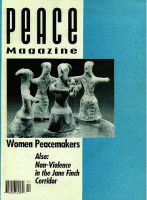
Peace Magazine Jul-Aug 1992, page 28. Some rights reserved.
Search for other articles by Jerry Diakiw here
For young adults 11 to 15 years old:
There is a continuing need for students to explore and understand the complex issues involved in international conflict. During World War II, there was widespread support for the war effort; the issues appeared black and white. Those who dissented were labelled traitors, fascists or at the very least were considered unpatriotic. Today's students live at a time when there has been a wide range of responses to a large number of controversial armed conflicts. These conflicts reveal central issues that continue to confront humanity, such as human rights, racism, oppression and exploitation.
Our young Canadians need a better context for understanding these complex issues. A significant body of children's literature, ranging from picture storybooks to young adult fiction, explores these issues in a meaningful way for young readers.
Good "war stories" have always been compelling reading for many, both young and old. They don't glorify war; they force us to see it from many view-points They examine complex moral issues. They are a prism for our deepest emotions.
This article will look at an assortment of war stories dealing with World War II. Next month we will look at stones from World War I, the Korean and Vietnam wars, conflict in Latin America and the Middle East, and as-sorted other wars. All stories are intended for eleven- to-fifteen-year-olds.
World War II has yielded one of the largest bodies of novels imaginable. Forty-five years after the war, new novels continue to be published in a steady stream about that remarkable period in human history. There is an enormous body of outstanding young adult literature about the Holocaust, starting with The Diary of Anne Frank. Holocaust novels are worthy of a separate article, so I will include only a few gems in the late body of literature of World War II.
I Was There, by Hans Peter Richter, a novel about two boys being inducted into the Hitler youth and The Wave by Morton Rhue, a true story of an experiment in a California high school, provide an insight into how a troupe of young people get caught up in such a movement. The Summer of My German Soldier by Bette Greene is an extremely popular novel about a young Jewish girl in Arkansas who hides an escaped German prisoner. The Last Mission by Henry Mazer recounts the experience of an underage youngster who becomes a gunner on a B-17 bomber and learns about the realities of war. Raspberry One, by Charles Ferry, is a novel about the experiences of the crew of a navy bomber in the war in the pacific. The Machine Gunner by Robert Westall is about teenagers living in England during the Blitz. They salvage a machine gun and befriend a downed German pilot Important issues are explored in this story of high adventure. His novel Blitzcat views the war through the eyes of a cat. Westafl's latest novel Kingdom By The Sea is a survival tale in bombed- out Britain.
In the pacific, Soo Nyal Choi writes compellingly in Yea of Impossible Goodbyes about the Japanese occupation of Korea. In So Far From the Bamboo Grove by Yoko Awashima, eleven-year- old Yoko and her Japanese family fall into danger while living in North Korea at the end of WW2. In Shanghai Passage by Gregory Patent, a childhood in World War II Shanghai is vividly described. The Days of the Bomb by Karl Bruckner tells the story of the bombing of Hiroshima through the eyes of Sadaka, a Japanese girl.
The popular young adult author Jill Paton Walsh has written two notable World War II novels: The Dolphin Crossing about a dramatic Dunkirk rescue and Firewood about two teenagers living alone during the London Blitz. Susan Cooper's classic The Dawn of Fear describes what happens to a group of children when one of them is killed in an air raid.
Two worthy novels with Canadian connections are Tug of War by Joan Lingard about a young boy who, fleeing hatred in Europe, has a chance meeting with a family on the way to Canada, and The Sky Is Falling, Kit Pearson's award-winning novel about a 10-year-old and her brother who are sent to Canada to wait out the war.
Jerry Diakiw is the superintendent of schools with York Region Board of Education.

Peace Magazine Jul-Aug 1992, page 28. Some rights reserved.
Search for other articles by Jerry Diakiw here